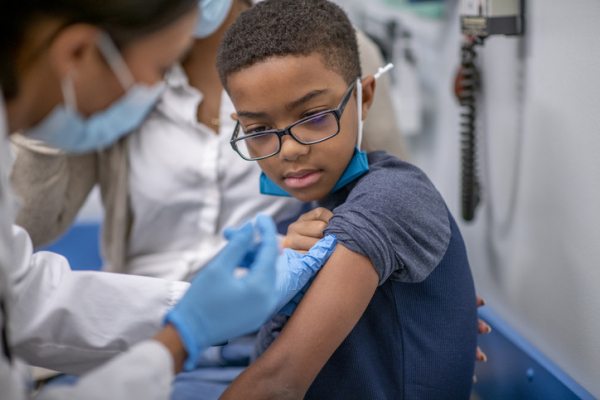
Helping children make friends: What parents can do

We all want our child to have friends. We want them to be happy, and to build the social skills and connections that will help them now and in the future.
Sometimes, and for some children, making friends isn’t easy. This is particularly true after the COVID-19 pandemic. Because of isolation and remote school, many children either didn’t learn the skills they need to make friends — or those skills got rusty.
Here are some ways parents can help.
Start at home: Learning relationship skills
Making and keeping friends involves skills that are best learned at home with your family. Some of them include:
- Empathy. Make sure that everyone in the family treats each other fairly and with kindness. Sometimes we turn a blind eye to sibling fights, or feel justified in snapping at our partner when we have had a long day. No matter what we say, our children pay attention to what we do.
- Curiosity about others. Make a family habit of asking each other about their day, their interests, their thoughts.
- Communication skills. These days, devices endanger the development of those skills. Shut off the devices. Have family dinners. Talk with each other.
- Cooperation. Do projects, play games, and do chores as a family. Work together. Help your child learn about taking turns and valuing the input of others.
- Regulating emotions. It’s normal to have strong feelings. When your child does, help them find ways to understand big emotions and manage them.
- Knowing when and how to apologize — and forgive. This really comes under empathy, but teach your child how to apologize for their mistakes, make amends, and forgive the mistakes of others.
All of these apply also to how you and your partner talk about — or with — other people in front of your children, too!
Be a good role model outside the home, too
When you are outside your home, be friendly! Strike up conversations, ask questions of people around you. Help your child learn confidence and strategies for talking to people they don’t know.
Make interactions easier
Conversations and interactions can be easier if they are organized around a common interest or activity. Here are some ways parents can help:
- Sign your child up for sports or other activities that involve their peers. Make sure it’s something they have at least some interest in doing.
- Get to know the parents of some of your child’s peers — and invite them all to an outing or meal. It could allow the children to get to know each other while taking some of the pressure off.
- When planning playdates, think about fun, cooperative activities — like baking cookies, or going to a park or museum.
Keep an eye on your child — but don’t hover
Ultimately, your child needs to learn to do this — and you don’t want to embarrass them, either. The two exceptions might be:
- If the children aren’t interacting at all, you might want to suggest some options for activities. Facilitate as necessary, and step back out again.
- If there is fighting or meanness on either side, you should step in and make it clear that such behavior isn’t okay.
Keep an open line of communication, and be supportive
Talk with your child regularly about their day, about their interactions, and how things made them feel. Listen more than you talk. Be positive and supportive. Remember that part of being supportive is understanding your child’s personality and seeing the world from their eyes. You can’t make your child someone they are not.
If your child keeps struggling with making friends, talk to your doctor
All parents need help sometimes — and sometimes there is more to the problem than meets the eye. This is particularly true if your child has ADHD or another diagnosis that could make interactions more challenging.
For information on supporting friendships at different ages, check out the advice from the American Academy of Pediatrics.
Follow me on Twitter @drClaire
About the Author

Claire McCarthy, MD, Senior Faculty Editor, Harvard Health Publishing
Claire McCarthy, MD, is a primary care pediatrician at Boston Children’s Hospital, and an assistant professor of pediatrics at Harvard Medical School. In addition to being a senior faculty editor for Harvard Health Publishing, Dr. McCarthy … See Full Bio View all posts by Claire McCarthy, MD

Why follow a vaccine schedule for children?

By the first week in September this year, US health officials had already tallied 247 cases of measles, a highly contagious illness. For perspective, in 2023, 59 measles cases were reported during the full year.
This isn’t surprising, as vaccination rates for preventable childhood illnesses have decreased, according to the Centers for Disease Control and Prevention (CDC). Between the 2019–2020 school year and the 2022–2023 school year, the percentage of fully immunized kindergarteners dropped from 95% to 93%.
Even a small decline like this affects herd immunity that helps protect our communities. (Herd immunity occurs when there are enough immunized people to make spread of an illness among unimmunized people less likely.) For measles, we need 95% of people — children and adults — to be immunized to achieve herd immunity.
How do vaccines help children?
The vaccines given before kindergarten protect children against serious illnesses and possible hospitalizations or even deaths:
- diphtheria, a serious respiratory illness
- hepatitis B and hepatitis A, both infections of the liver. Hepatitis B infections can be chronic and lead to liver damage.
- pneumococcus and Haemophilus Influenzae, bacteria that can cause serious infections
- measles, which can cause pneumonia and neurological problems
- mumps, which causes swollen glands in the neck and can sometimes lead to complications
- pertussis (whooping cough), which can be fatal in infants
- polio, which can cause a paralysis that can be fatal
- rotavirus, a diarrhea that can lead to serious dehydration in young infants
- rubella, or German measles. If women catch it during pregnancy, it can lead to miscarriage or birth defects.
- varicella (chickenpox). While most infections are mild, the rash caused by chickenpox can get infected, and the virus itself can affect the lungs or brain.
What to know about vaccine exemptions and schedule changes
The most concerning part of the CDC report is that it’s not just that families got behind in their doctor visits, it’s that more are choosing not to vaccinate. Vaccine exemptions rose from 0.4% to 3% in the 2022–2023 school year. That 3% is an average; 10 states have exemption rates over 5% (Idaho’s exemption rate was 12.1%).
Some parents have children vaccinated, but alter the schedule. In a 2020 study, researchers found that only 63% of families followed the recommended vaccination schedule for their children. Among those who didn’t, the majority followed an alternate schedule, spacing vaccines out, skipping some, or doing a combination of both.
But vaccines are given on a schedule for a reason: to protect children from vaccine-preventable disease. Experts designed the schedule so that children get protection when they need it — and the doses are timed so the vaccine itself can have the best effect. When parents don’t follow the schedule, their children may not be protected.
Worried about getting several vaccines at once?
Parents sometimes worry about giving several vaccines at once, something that the schedule calls for, especially at the 2-, 4-, and 6-month visits. Not only is it safe, but when parents spread out the schedule it takes longer before the child is protected, leaving babies vulnerable to these diseases. It also means more visits to the doctor: the study found that babies whose parents used an alternate schedule had three more vaccination visits than babies whose parents followed the recommended schedule.
Worried about side effects?
Parents also worry about side effects of vaccines and other risks, often fueled by information they get on social media. Not every person who gets these infections has a serious case or complications. But the risk of a complication of the disease is always higher than the risk of the vaccine, an important fact that sometimes gets lost in the vaccine discussion.
When children get behind on vaccines, they are more likely to catch vaccine-preventable illnesses — which is not only dangerous for them, but also for those around them who aren’t vaccinated, as we have seen in measles outbreaks. It is not just children whose parents choose not to vaccinate them that are at risk, but also children who can’t be vaccinated, such as newborns or those who are taking medications that suppress the immune system. Adults with suppressed immune systems can be at risk too. Parents often forget that the decisions they make about immunization affect more people than just their child.
How can you learn more about vaccines?
It’s normal for parents to have questions and worry about medical treatments given to their children. After all, it’s a parent’s job to worry. But as parents question and worry, it’s really important that they get reliable medical information from expert sources. The Centers for Disease Control and Prevention, as well as Immunize.org and the American Academy of Pediatrics, have lots of accurate and useful information, and parents should always talk to their child’s doctor if they have concerns.
The bottom line for parents
Think long and hard, and get information from reliable sources, before you change your child’s vaccine schedule. The schedule is there to protect your child — and everyone around your child.
About the Author

Claire McCarthy, MD, Senior Faculty Editor, Harvard Health Publishing
Claire McCarthy, MD, is a primary care pediatrician at Boston Children’s Hospital, and an assistant professor of pediatrics at Harvard Medical School. In addition to being a senior faculty editor for Harvard Health Publishing, Dr. McCarthy … See Full Bio View all posts by Claire McCarthy, MD